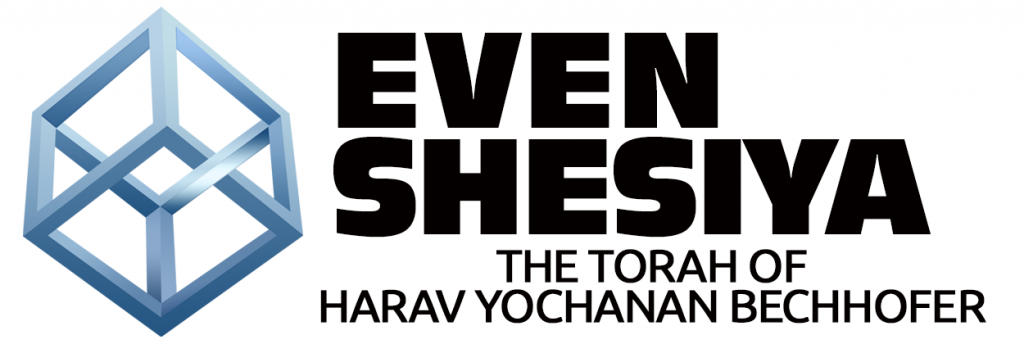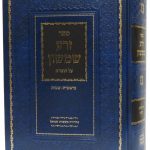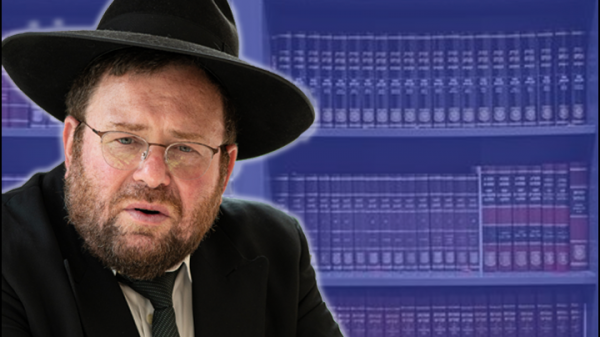Click here to download PDF
Nitzavim & Rosh Hashanah
Parshas Nitzavim is always the parsha we read right before Rosh Hashanah, therefore there must be some message Rosh Hashanah in it. Rashi (29:12) Re-works the pesukim based on the midrash and says that the reason why Parshas Nitzavim is right after reading all the curses in partial Ki-Savo is that when the Jews heard the 98 curses of Ki-Savo aside from the 49 curses in Bechukosai their faces turned green and they said, “who can withstand all these curses?” Moshe started to calm them “you are “Nitzavim”-standing firm “Hayom”- today many times you angered Hashem and he never wiped you out and here you are standing before him”. Rashi continues: “Hayom”- today – like today that exists, and it is first dark and then light so also Hashem has given you light and will continue to give you light and these curses and pains will actually sustain you and stabilize you before him…”. The general gist of what this has to do with Rosh Hashanah is obvious: just like the Jewish people were afraid of the attribute of judgement expressed by the curses, so also every year we are petrified of the upcoming judgement that we face on Rosh Hashanah and we read parshas Nitzavim to remind ourselves that as bad as we’ve been, Hashem never abandoned us and certainly never wiped us out. What is cryptic is what Rashi says on the word “Hayom”-today “it is dark and then light…” why is the darkness mentioned? Rashi seemingly answers that by saying a greater mystery at the end of the sentence: “because all the curses and the pain will sustain you and stabilize you”! How does that work? Why is that the case?
Din or Not?
There’s an inner contradiction in Rosh Hashanah being a day of judgement. We’re being judged and seemingly the judge does not want loopholes he wants to enforce the law. Why is it that Hashem actually commands us to blow shofar Which, Chazal say, quiets the Satan from prosecuting and even makes Hashem “get up from the Throne of judgement and sit on the Throne of Mercy and convert the judgement to mercy”. Does Hashem want to judge or not? If He doesn’t want to judge, the don’t judge at all! Why is there this seemingly charade of judging but actually commanding us to use the shofar to annul the judgment and move it to Mercy? The Midrash in parshas Emor actually says it as follows: “… just like shofar you blow in one end and the Sound comes out the other end so also Hashem gets up from the Throne of judgment and sits on the Throne of mercy and converts the Judgment into Mercy” The metaphor and the application are not congruent. The blowing of the shofar is a natural Continuum, the air that goes in one side of the shofar will come out the other side. Whereas getting up from the Throne of judgement and sitting on the Throne of mercy and converting the Judgment into Mercy is switching sides! How do we understand how the metaphor fits the application?
Din & Rachamim- Plan & Action
Chazal tell us Hashem contemplated creating the world with “Din”-Law, but he saw that it would not last, so he added the attribute of mercy and created it. Hashem doesn’t make mistakes and Hashem knows the future before it ever happens. How can Hashem contemplate one way and then decide that’s not a good plan? With a more careful reading of this chazal we observe two important points: First – Hashem never changed his mind about “Din” but rather added Mercy! Second – There is a definite progression from thought to physical actuality. The world was created in thought with “Din” and physical actuality with Mercy. Why?
Firm & Flexible
The creative process starts with design and plans. What are design and plans? Laws. You make decisions as to what it should look like, how big, how small, what shape, what color, what properties, what function, etc. With those decisions you are ruling out (outlawing) infinite other possibilities. Another word for this is “Din”- law. Hashem contemplating the world with “Din” means exactly that! “Din” legislates, designs, and gives structure. However physical reality being what it is, as “the flesh is weak”, will never fully live up to plan 100% all the time and for that we must add flexibility. That’s what it means “He saw it will not endure…”-the weakness of the material will not be able to be fully in accordance with the plan, so He added Mercy- which is flexibility and created it in actuality. It is not realistic to have a physical world, with all the limitations of physicality, conform a hundred percent of the time to the optimal plan. such a world does not exist in physical reality, unless you are willing to add flexibility. That’s what it means he added mercy and created it.
Din – the source of the Natural laws
Another function of “Din” is to make something firm and immutable. If you want to make something, you want to build it to last. Why should it last? Why does it have the lifespan that it has? Because it’s built on certain natural laws: the laws of biology, chemistry, and physics. These laws are firm because they are made by “Din”. Mercy doesn’t force anything. Just the opposite, it adds flexibility! For endurance you need firm, not flexible. This is another reason why the creative process has to start with “Din”: to give a solid foundation! After there’s a solid foundation of laws, flexibility could be added, but nothing can be built on flexibility! Flexibility is not a firm foundation….
Earning & Deserving
These ideas allow us to have a much deeper appreciation of what the Ramchal explains in the “Derech Hashem” (Section 1 chapter 2) that Hashem created the world to bestow goodness, but the only real goodness is an earned goodness – otherwise it is ‘bread of shame’. The Ramchal explains that the earned goodness makes one really truly the master of that good because it is his. In Mercy there’s no such thing as ‘mine’ or ‘yours’. Something belonging to me is my right ‘rights’ are built on law-“Din”.
It’s not just a psychological difference or a legal difference but rather the Perfection that is earned through “Din” is firm! That’s why the Perfection that we earn with our Mitzvahs gives us ‘Olam Haba’ and makes us eternal -Because “Din” firm and everlasting. If this would have been a gift, and nothing that we rightfully earned it would not be firm, and there’s no reason why it should be something that must make us Eternal.
Din – cleansing agent
Another aspect of “Din” is that although it punishes us for our wrongdoings, Hashem’s punishment is not like Earthly punishment. Earthly punishment is an imposed idea human beings made it up and it is purely punitive. Hashem’s Justice comes from the very same “din” that created the world! It is actually to realign things, cut them back into shape, but more than that it has the special quality of cleaning and repairing the damage. Hashem’s judgment gives “Kaparah” and “Tahara”- atonement and purification and it is actually the best thing for the sinner! It is his medicine and cure, so he can be cleaned up and have a fair chance of attaining the immortality that could be earned through mitzvahs.
Din & Rachamim – Night & Day
All this opens up an amazing realization: “Din” and mercy are not mutually exclusive, they have a cooperative relationship to bring a project from plan to physical actuality. This is what Rashi meant to say like the “day” which is the most basic form of existence. It is what was created on the very first “day” with the darkness and the light that comprise the day. This most basic original form of existence has two parts: the dark and the light. The dark alluding to the “Din” – the Judgment, as it does bring Darkness by ruling out all the infinite other possibilities, as opposed to the one that is actually Chosen. Then there’s the light and that’s the further flexibility that is added. Just like night gives way to day, as the new day begins with the night, so also everything starts with “Din” and “Din” itself wants mercy to be added to add the flexibility to bring the project to full fruition. It is a continuum like the daily cycle night naturally leading in today is the din naturally wants to add mercy so that which it is trying to create will come to fruition. And that’s what Rashi continues to explain that these curses and pains sustain you and stabilize you. Hashem’s judgment is not about destruction, He does it to clean us up and heal us. If not for divine retribution, we would self-destruct with all the contamination we bring upon ourselves and the world! These curses and pains sustain the world by expunging the contamination from reality thus stabilizing the world.
Yitzchak Yaakov & Eisov revisited
The Zohar (3: 98b) tells us that on Rosh Hashanah a famous biblical event renews itself: Yitzchak wants to give the Brachos to Eisov. Eisov wants to give his ‘cook dishes’ to Yitzchak whose attribute is “Din” representing that he wants to prosecute against the Jewish people – as the prosecutor ‘feeds’ the judge the charges he lays out against those he’s prosecuting. The shofar sound is the voice of Yaakov who came in first and gave Yitzchok ‘his dishes’ which are all the wonderful prayers of the Jewish people and it a starts with the shofar which represents the voice of Yaakov that called out to his father and got him to take his ‘dishes’ (prayers) and then there is tremendous joy and light in reality. On Rosh Hashanah there’s the great Cosmic race to activate the “Din” – whether the blessings of Yitzchak- the power of them should be an avenging Force, which is the way the nations of the world perceive the “Din” and interact with it accordingly. Chazal point out: the nations of the world whenever they have to go to court they go in hungry, shabby, and unshaven, as they are deathly nervous. The Jewish people go into court with Hashem on Rosh Hashanah shaved, bathed, and in their best clothes because we understand that Hashem’s attribute of judgment is for the sake of the world – to renew it from the plan downwards and to give it a firm existence and when necessary. To clean it up so it should be stabilized! The Goyim understand “Din” as an avenging force and that’s why they are scared of it – and they interact with it on that basis, they try to flare it up against the Jewish people. We understand that Hashem’s judgment is a renewal of existence – not something anti existence. That’s why the new year starts on this day of judgment. It is just like the beginning of the world itself, the world started with contemplating creating the world with “Din” – that’s what happens on Rosh Hashanah! Eisov represents the nations of the world and wants to harness “Din” as a destructive force – the way he misunderstands it. Yaakov represents the Jewish people who get Yitzchok-“Din” to turn towards us with love.
Din becomes Rachamim – Naturally
Rosh Hashanah is not about dying. It’s about being legislated to live with the power of the law! The power of the law itself yearns and wants to be combined with Mercy to bring the new world to full fruition. That’s what the Midrash means: “….. I will be like the shofar, you blow in one end and the sound comes out the other end, so also I get up from the Throne of Din and sit on the Throne of Mercy…etc.” – it’s not switching sides, it’s a Continuum! It’s like the sound of the shofar which is the voice of Yaakov calling to Yitzhak that’s causing judgement itself to move to Mercy and turns the attribute of judgment to Mercy which is in other words: moving the renewed existence from potential to full actuality.
Getting on the same side of the Law
With this we could understand why on Rosh Hashanah, a day of judgement we don’t beg for mercy. Begging for mercy we do subsequently on Yom Kippur. We’re on trial today, why are we not begging for mercy today? Because the day of Rosh Hashanah is the day to reconcile ourselves with what Hashem’s judgement is. We accept Him as king and we accept his laws as life itself! Once we are reconciled with His being King and that His law is life then we have a healthy foundation with which to say to say ‘sorry’. If we set ourselves up in a oppositional position to his law, like the nations of the world, then we have no right to say ‘sorry’, and the law would demand our removal from reality – because we’re “Anti-reality”! The service of Rosh Hashanah is to accept Hashem as King, and to accept His Law as the rock-hard foundation of life and on that healthy basis we could improve our relationship with him and get forgiveness.










